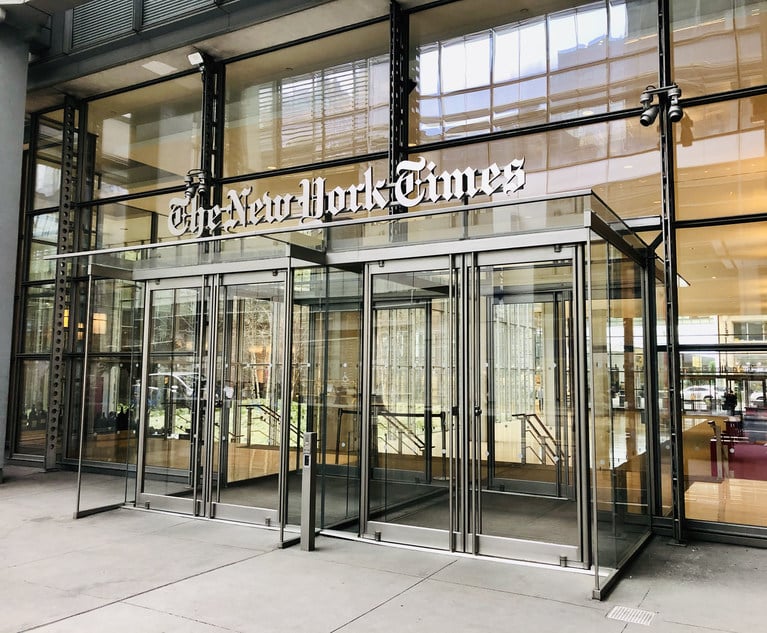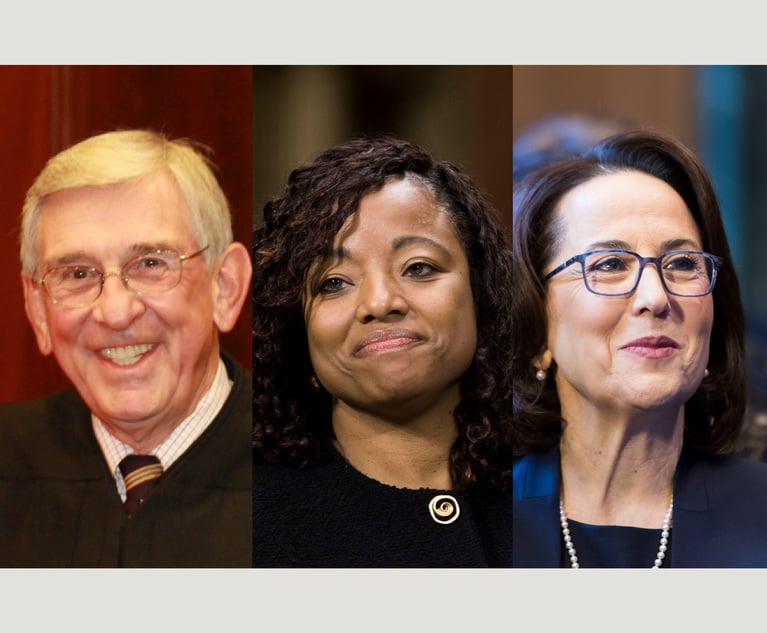Justices Struggle With Privacy Rights in Police Searches of Rental Cars
“What worries me is what's our rule going to be,” Justice Stephen Breyer said Tuesday. “Are we going to have a [Fourth Amendment] rule for car rental cases?”
January 09, 2018 at 03:20 PM
4 minute read
 Justice Stephen Breyer (2015). Photo by Diego M. Radzinschi/ALM
Justice Stephen Breyer (2015). Photo by Diego M. Radzinschi/ALM
The U.S. Supreme Court on Tuesday went looking for a clear rule to apply to police searches of rental cars whose drivers are not authorized on the rental agreement to be behind the wheel. At the end of an hour-long argument, the justices were still searching.
“What worries me is what's our rule going to be,” said Justice Stephen Breyer. “Are we going to have a [Fourth Amendment] rule for car rental cases?”
The case, Byrd v. United States, reads like a law school exam hypothetical: Does the driver who was stopped—who is only behind the wheel with the permission of the authorized driver—have a reasonable expectation of privacy in the vehicle?
The U.S. Court of Appeals for the Third Circuit concluded last year that one driver, Terrence Byrd, did not have a privacy expectation after a highway stop near Harrisburg, Pennsylvania. Byrd, according to police, consented to a search of the car and its locked trunk. The officers also reportedly told Byrd they didn't need his consent since he was not an authorized driver on the rental agreement. Byrd said his fiancée, who was the authorized driver, gave him permission to drive the rental car. In searching the trunk, police found body armor and heroin.
During arguments, Byrd's pro bono lawyer, Robert Loeb of Orrick, Herrington & Sutcliffe, faced a web of hypothetical situations posed by the justices—from rental car hijackers to fathers giving permission to sons to drive the family car to car rental agreements permitting police searches.
“If you're given permission by the renter to store your personal items in the car, you have a reasonable expectation of privacy,” Loeb argued. “Unless it's a stolen car or a criminal trespass, there is the ability to invoke the Fourth Amendment.”
But Eric Feigin, an assistant to the solicitor general, pressed a hard-line approach.
“Byrd has to justify an affirmative connection to the rental car,” Feigin countered. “He can't do it. As an unauthorized driver, he has no connection to the car,” and so no reasonable expectation of privacy in it. And, he added, Byrd's fiancée had no authority to give him permission to drive the rental.
Justice Sonia Sotomayor said she worried that under the government's approach, police would have incentive to stop every rental car and fully search those in which there is an unauthorized driver. Justice Elena Kagan noted that a violation of the authorized driver requirement—“not uncommon,” she said—goes to insurance liability, not the Fourth Amendment.
Chief Justice John Roberts Jr. said: “It's important to give clear guidance to the police. If it's a rental car, look at the agreement. If you're not authorized to drive, that's it.”
Even if the rental agreement is not in the rental car, Feigin replied, “We'd make the same argument.”
Read more:
This content has been archived. It is available through our partners, LexisNexis® and Bloomberg Law.
To view this content, please continue to their sites.
Not a Lexis Subscriber?
Subscribe Now
Not a Bloomberg Law Subscriber?
Subscribe Now
NOT FOR REPRINT
© 2025 ALM Global, LLC, All Rights Reserved. Request academic re-use from www.copyright.com. All other uses, submit a request to [email protected]. For more information visit Asset & Logo Licensing.
You Might Like
View All
US Courts Announce Closures in Observance of Jimmy Carter National Mourning Day
2 minute read
Who Got the Work: Gibson Dunn and Wilmer to Defend BlackRock in ESG Antitrust Lawsuit
2 minute read
New York Times Moves for $100K in Attorney Fees Against Dfinity Foundation
3 minute read
Split 4th Circuit Revives Constitutional Challenge to Child Vaccine Mandate
Trending Stories
- 1Restoring Trust in the Courts Starts in New York
- 2'Pull Back the Curtain': Ex-NFL Players Seek Discovery in Lawsuit Over League's Disability Plan
- 3Tensions Run High at Final Hearing Before Manhattan Congestion Pricing Takes Effect
- 4Improper Removal to Fed. Court Leads to $100K Bill for Blue Cross Blue Shield
- 5Michael Halpern, Beloved Key West Attorney, Dies at 72
Who Got The Work
Michael G. Bongiorno, Andrew Scott Dulberg and Elizabeth E. Driscoll from Wilmer Cutler Pickering Hale and Dorr have stepped in to represent Symbotic Inc., an A.I.-enabled technology platform that focuses on increasing supply chain efficiency, and other defendants in a pending shareholder derivative lawsuit. The case, filed Oct. 2 in Massachusetts District Court by the Brown Law Firm on behalf of Stephen Austen, accuses certain officers and directors of misleading investors in regard to Symbotic's potential for margin growth by failing to disclose that the company was not equipped to timely deploy its systems or manage expenses through project delays. The case, assigned to U.S. District Judge Nathaniel M. Gorton, is 1:24-cv-12522, Austen v. Cohen et al.
Who Got The Work
Edmund Polubinski and Marie Killmond of Davis Polk & Wardwell have entered appearances for data platform software development company MongoDB and other defendants in a pending shareholder derivative lawsuit. The action, filed Oct. 7 in New York Southern District Court by the Brown Law Firm, accuses the company's directors and/or officers of falsely expressing confidence in the company’s restructuring of its sales incentive plan and downplaying the severity of decreases in its upfront commitments. The case is 1:24-cv-07594, Roy v. Ittycheria et al.
Who Got The Work
Amy O. Bruchs and Kurt F. Ellison of Michael Best & Friedrich have entered appearances for Epic Systems Corp. in a pending employment discrimination lawsuit. The suit was filed Sept. 7 in Wisconsin Western District Court by Levine Eisberner LLC and Siri & Glimstad on behalf of a project manager who claims that he was wrongfully terminated after applying for a religious exemption to the defendant's COVID-19 vaccine mandate. The case, assigned to U.S. Magistrate Judge Anita Marie Boor, is 3:24-cv-00630, Secker, Nathan v. Epic Systems Corporation.
Who Got The Work
David X. Sullivan, Thomas J. Finn and Gregory A. Hall from McCarter & English have entered appearances for Sunrun Installation Services in a pending civil rights lawsuit. The complaint was filed Sept. 4 in Connecticut District Court by attorney Robert M. Berke on behalf of former employee George Edward Steins, who was arrested and charged with employing an unregistered home improvement salesperson. The complaint alleges that had Sunrun informed the Connecticut Department of Consumer Protection that the plaintiff's employment had ended in 2017 and that he no longer held Sunrun's home improvement contractor license, he would not have been hit with charges, which were dismissed in May 2024. The case, assigned to U.S. District Judge Jeffrey A. Meyer, is 3:24-cv-01423, Steins v. Sunrun, Inc. et al.
Who Got The Work
Greenberg Traurig shareholder Joshua L. Raskin has entered an appearance for boohoo.com UK Ltd. in a pending patent infringement lawsuit. The suit, filed Sept. 3 in Texas Eastern District Court by Rozier Hardt McDonough on behalf of Alto Dynamics, asserts five patents related to an online shopping platform. The case, assigned to U.S. District Judge Rodney Gilstrap, is 2:24-cv-00719, Alto Dynamics, LLC v. boohoo.com UK Limited.
Featured Firms
Law Offices of Gary Martin Hays & Associates, P.C.
(470) 294-1674
Law Offices of Mark E. Salomone
(857) 444-6468
Smith & Hassler
(713) 739-1250










